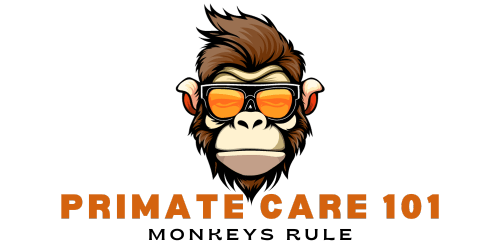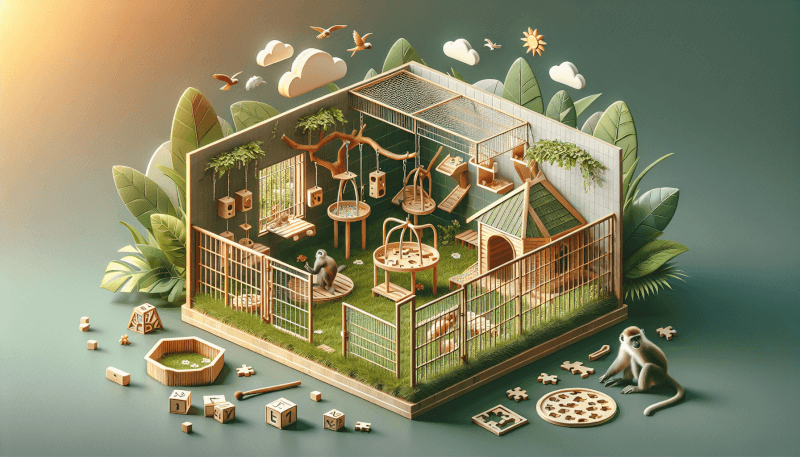If you’ve ever considered bringing a pet monkey into your home, understanding their housing requirements is crucial. Creating a safe and comfortable environment for these playful companions is essential for their well-being. From providing ample space for movement to ensuring a stimulating living area, this article will guide you through the essential housing requirements that are necessary to keep your pet monkey happy and healthy.

Inside Housing
Space
When it comes to housing pet monkeys, providing adequate space is essential for their physical and mental well-being. Monkeys are naturally active and curious animals, so it’s important to offer them a living space that allows them to move around freely and explore their surroundings. A spacious enclosure or cage should be provided, ensuring that it is large enough for the monkey to stretch, climb, and play without feeling confined.
Cage or Enclosure
When considering the type of housing for your pet monkey, there are two main options to choose from: cages or enclosures. Cages are typically made of metal bars and provide a safe and secure environment for the monkey. Enclosures, on the other hand, are usually larger and can be constructed using a combination of materials such as wire mesh and wooden panels. Both options have their own advantages, and the choice ultimately depends on the specific needs and preferences of your monkey.
Enrichment
Monkeys are highly intelligent creatures that require mental stimulation and enrichment to prevent boredom and promote their overall well-being. Inside their housing, it is important to provide various forms of enrichment, such as toys, puzzles, and foraging opportunities. These activities help mimic their natural behaviors in the wild and engage their cognitive abilities, keeping them mentally engaged and stimulated.
Temperature and Humidity
Creating a suitable environment with the right temperature and humidity levels is crucial for the health and comfort of your pet monkey. Monkeys typically thrive in temperatures ranging from 70 to 85 degrees Fahrenheit (21 to 29 degrees Celsius). However, it’s important to note that different species of monkeys may have specific temperature requirements, so it’s vital to research the specific needs of your monkey’s species. Additionally, maintaining the appropriate humidity levels, typically ranging from 50% to 70%, is necessary to prevent dry skin and respiratory issues.
Outside Housing
Outdoor Enclosure
Providing an outdoor enclosure for your pet monkey is highly beneficial, as it allows them to experience natural sunlight, fresh air, and a larger space to explore. The outdoor enclosure should be secure, with sturdy fencing that prevents the monkey from escaping and predators from entering. It should also have natural elements like trees, branches, and grass, which can provide additional enrichment and mimic their natural habitat.
Safety Measures
Ensuring the safety of your pet monkey is of utmost importance when designing their outdoor enclosure. Regular inspections should be conducted to check for any potential hazards such as sharp objects, toxic plants, or loose wires. Additionally, the enclosure should be designed in a way that prevents unauthorized access by strangers or other animals that could pose a threat to your monkey’s safety.
Shade and Shelter
While exposure to natural sunlight is beneficial for pet monkeys, it’s important to provide adequate shade and shelter in their outdoor enclosure. This will protect them from extreme weather conditions such as excessive heat, cold temperatures, or heavy rain. Providing a variety of shaded areas, such as trees or covered structures, will give your monkey the option to seek shelter when needed, ensuring their comfort and wellbeing.

Socialization and Interaction
Companionship
Monkeys are highly social animals that thrive on companionship and interaction. It is important to dedicate time and effort to socializing your pet monkey and providing them with the opportunity to interact with other monkeys or suitable animal companions. This can be done through supervised playdates with other monkeys or by considering adopting another compatible primate as a companion for your pet monkey.
Toys and Activities
To keep your pet monkey mentally stimulated and entertained, it’s important to provide them with a variety of toys and activities. Monkeys enjoy objects that can be manipulated, such as puzzle feeders, climbing structures, and interactive toys. Regularly rotating and introducing new toys will help prevent boredom and encourage your monkey to engage in natural behaviors such as climbing, problem-solving, and foraging.
Health and Safety
Veterinary Care
Regular veterinary care is essential to ensure the health and well-being of your pet monkey. Monkeys can be prone to certain health issues, so it’s important to establish a relationship with an experienced veterinarian who specializes in primate care. Routine check-ups, vaccinations, and preventive care, along with prompt medical attention when needed, are crucial in maintaining your monkey’s overall health.
Food and Water
Providing a healthy and balanced diet is vital for the proper nutrition of your pet monkey. Their diet should consist of a variety of fruits, vegetables, leafy greens, and a source of protein. Food should be provided in a way that encourages natural foraging behaviors and promotes mental stimulation. Fresh and clean drinking water should be readily available at all times.
Hygiene and Cleanliness
Maintaining proper hygiene and cleanliness in your pet monkey’s housing is essential for their health and well-being. Regular cleaning of the enclosure or cage, including removing waste, replacing soiled bedding, and disinfecting surfaces, will help prevent the spread of bacteria and parasites. Providing a clean and hygienic environment will minimize the risk of infectious diseases and ensure a healthy living space for your pet monkey.

Legal Considerations
Permits and Licenses
Owning a pet monkey may be subject to specific permits or licenses depending on your location. It is important to research and comply with the legal requirements relevant to your area. Obtaining the necessary permits and licenses ensures that you are adhering to regulations and protecting both your monkey and yourself legally.
Local Regulations
In addition to permits and licenses, there may be specific local regulations regarding the ownership and housing of pet monkeys. These regulations could include restrictions on the number of monkeys you can own, zoning requirements, or specific housing guidelines. Familiarizing yourself with these regulations is important to ensure you are in compliance and providing a suitable living environment for your pet monkey within legal boundaries.
In conclusion, providing appropriate housing for pet monkeys involves considerations such as space, enrichment, temperature, and humidity. Outdoor enclosures should be secure, with safety measures and provisions for shade and shelter. Socialization and interaction are key for monkeys, including opportunities for companionship and engaging toys and activities. Health and safety require regular veterinary care, a balanced diet, and proper hygiene. Finally, understanding and complying with legal considerations, including permits, licenses, and local regulations, is essential for responsible monkey ownership. By prioritizing these housing requirements, you can provide a safe, stimulating, and fulfilling environment for your pet monkey’s overall well-being.


